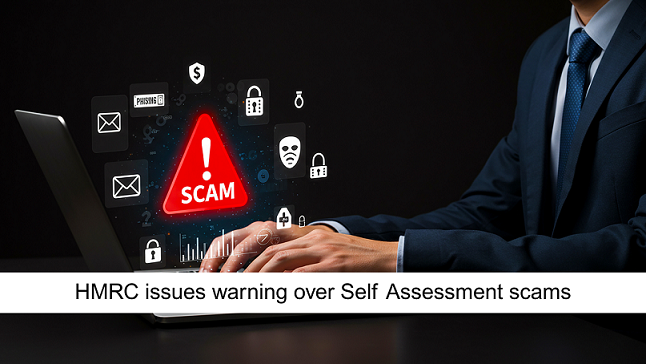
HMRC has warned that scams are increasing as the 31 January Self-Assessment deadline gets closer. Scammers pretend to be from HMRC by sending emails, texts, or making calls, offering fake tax refunds or threatening legal action to trick people into giving away personal details or money. It’s essential to be cautious, verify all messages through official HMRC channels, and report any suspicious contacts immediately to protect your safety. As the Self Assessment deadline nears, it’s vital to stay alert, as fraudsters often strike whether you’ve filed your return or not.
Who is at Risk of Self-Assessment Scams?
Self-assessment scams often target specific groups, especially during tax season. Understanding who is at risk can help you stay protected.
- Company directors, sole traders, and shareholders -
These groups commonly use self-assessment and are frequent scam targets.
- First-time Self Assessment filers -
New filers may not recognise official HMRC contacts, making them vulnerable.
- People receiving unexpected HMRC contact -
Scammers often reach out via phone, email, or text pretending to be HMRC.
- Those unaware of official HMRC communication -
Lack of knowledge about HMRC’s processes increases scam risk.
- Vulnerable individuals -
People less familiar with technology or stressed by deadlines are more at risk.
Scam Tactics to Be Aware Of
Be aware of these common tactics scammers use to trick individuals regarding tax payments and refunds:
- Scammers offer fake tax refunds and ask for personal or bank details.
- They threaten arrest or legal action if the tax isn’t paid quickly.
- They demand urgent payments using unusual methods like gift cards.
- Fake calls, emails, or texts come from impersonated HMRC contacts.
- Messages may contain phishing links to steal login or financial information.
How to Report These Self-Assessment Scams
Reporting scams helps stop fraudsters from tricking more people. Here’s how you can report suspicious activity:
- Forward suspicious HMRC texts to 60599 (free of charge).
- Send scam emails to phishing@hmrc.gov.uk.
- Report scam calls via the HMRC online form on GOV.UK.
- If you lost money, report it to Action Fraud immediately.
- Contact your bank if you shared your card or account details.
- Always verify HMRC messages by logging into your official GOV.UK account, not through links in messages.
Additional Practical Advice to Avoid Falling Victim
Stay protected by following this additional advice to avoid HMRC-related scams:
- Don’t respond immediately to urgent or threatening messages.
- Always verify contacts using official HMRC numbers on GOV.UK.
- Avoid sharing personal information on insecure sites or social media.
- Teach family and friends, especially those less tech-savvy, about HMRC scams.
- Report any suspicious messages or activity right away.
Why Staying Alert Matters
HMRC warns tax season brings risks of fraud and identity theft, causing financial and credit harm. Knowing scam tactics and reporting helps protect yourself and fight fraud. HMRC updates guidelines and works with authorities. Staying aware and cautious is the best defence.
In Conclusion
If you're filing a Self-Assessment tax return, stay alert to scams. HMRC will never rush or threaten you. Always use official channels and report suspicious contact. Practice safe online habits and seek professional help if unsure. File confidently with our expert advisers to ensure a secure and stress-free tax season.
How Can PHS Associates Help You?
To protect yourself from Self Assessment scams, always ensure your tax return is filed accurately and on time with trusted help. If you want to protect yourself from this scam then PHS Associates can guide you safely through the process, helping you avoid fraudulent contacts and penalties. Stay secure. Contact us at 0208 8611685 or info@phs-uk.co.uk for expert support.
Frequently asked questions
It is a letter from HMRC about your Self Assessment or tax issues; beware, as some similar letters can be scams.
HMRC issues public warnings about phishing emails, texts, and calls offering fake rebates or demanding urgent payments.
Yes, HMRC contacts taxpayers, but never threatens arrest or demands payment urgently via calls, texts, or emails.
Genuine HMRC contacts won't threaten arrest or demand payment via unusual methods; check contacts on GOV.UK and never trust WhatsApp or QR codes.
Verify it using GOV.UK, do not provide personal information to suspicious requests, and report suspicious letters or emails to HMRC immediately.
